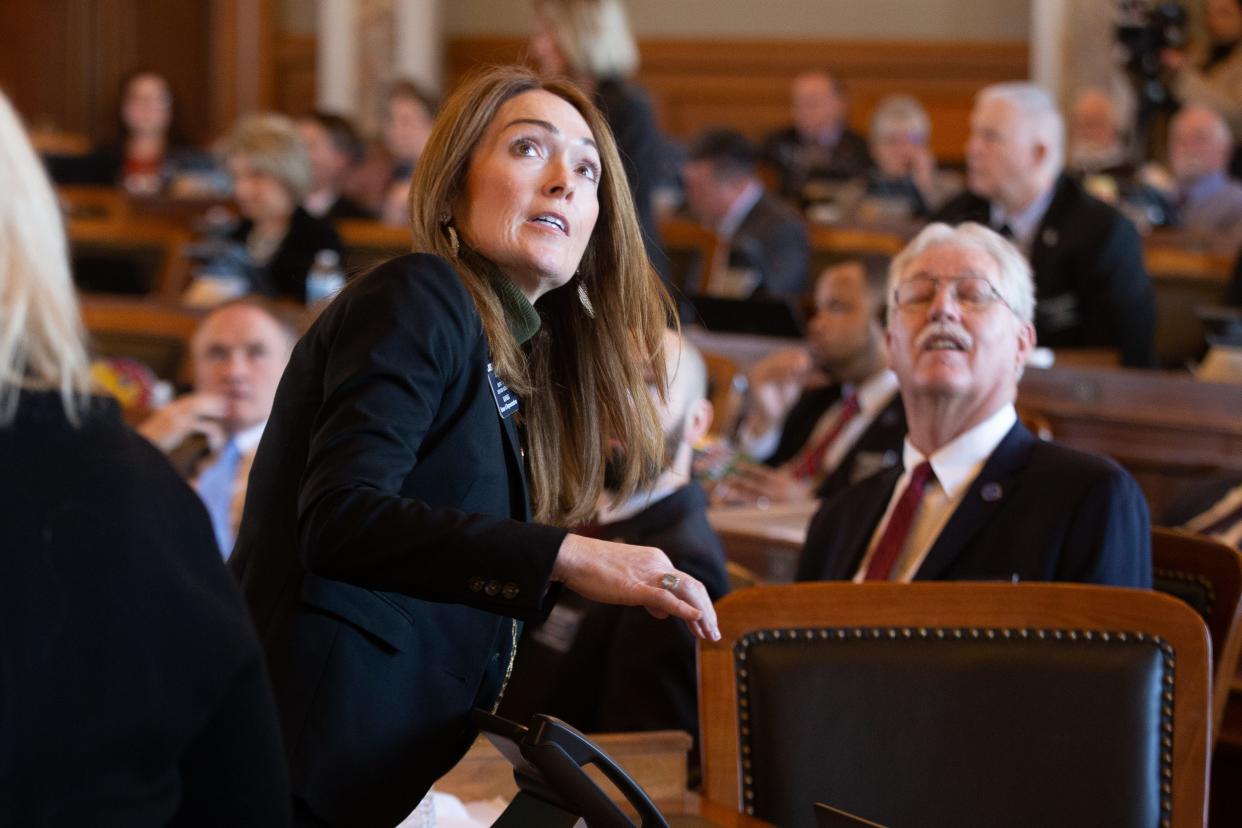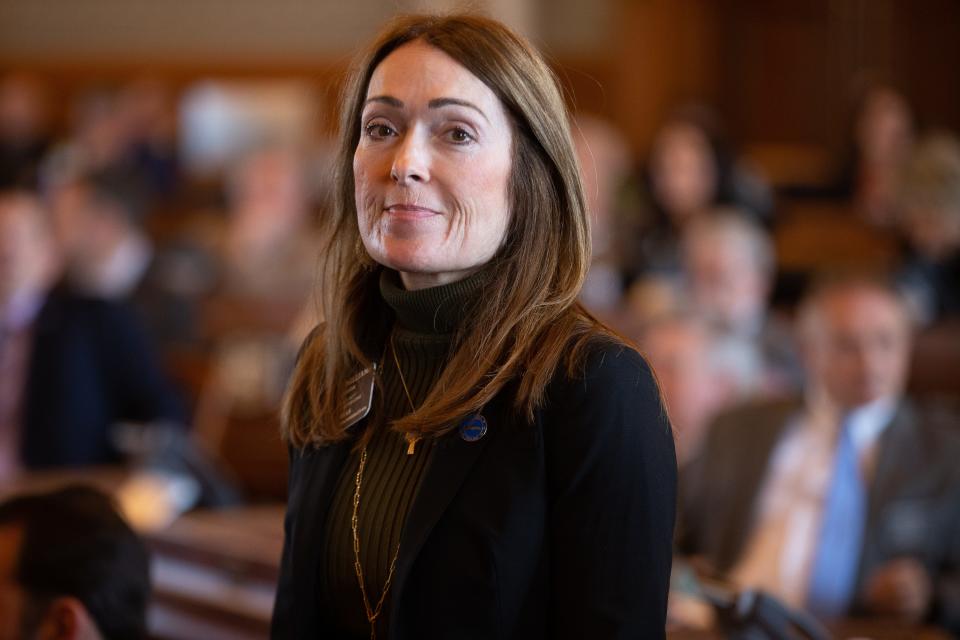With Republicans divided, major school choice bill narrowly passes Kansas House

- Oops!Something went wrong.Please try again later.
Kansas Republicans narrowly succeeded in pushing a major school choice proposal through the House, but without enough support to overcome a likely gubernatorial veto.
The House voted 64-61 on Wednesday to pass Senate Bill 83, dubbed the Sunflower Education Equity Act, which would establish an educational savings account program in Kansas. All but one Democrat opposed the bill, as did 22 Republicans.
"We recognize that not all kids thrive in a traditional school setting, whether public or private," said Rep. Kristey Williams, R-Andover. "We recognize plummeting student outcomes cannot be answered with simply adding more money or more time. We resist the temptation to dismiss new ideas, such as education savings accounts or ESAs, for fear of hurting a system rather than remembering why the system exists — for the students within."
More:Kansas school vouchers, education savings account and tax credit scholarships explained
Williams, who chairs of the House K-12 Education Budget Committee, called it an "atypical" and "bipartisan" solution, despite there being more bipartisan opposition than bipartisan support.
"What this is doing is putting parents in the driver's seat," Williams said. "The parent is now using their ability to take a small portion of money and use it for the betterment of the education of their child. They don't have that choice right now. The only school choice they've got right now is if you can afford it."
Rep. Mari-Lynn Poskin, D-Leawood, said the proposal is "unpopular because it creates a second, unregulated and unaccountable private education system with an undetermined fiscal note that is taxpayer funded."
The vote was not without drama, as the vote tally started at 60-64. Rep. Bill Sutton, R-Gardner, was mysteriously absent as the chamber locked itself in, giving GOP leadership time to whip votes. Reps. Ken Collins, R-Mulberry, Samantha Poetter Parshall, R-Paola, and Robyn Essex, R-Olathe, ultimately flipped before Sutton returned smiling and holding a coffee mug.
All five Topeka Democrats opposed the bill, as did two Republicans, Reps. Fred Patton and Jesse Borjon, leaving Republican Ken Corbet as the only member of the Shawnee County delegation to support the bill.
"I came to Topeka to be an advocate for public education. That's important to me," said Rep. David Younger, R-Ulysses, a former public school teacher and administrator who voted against the bill.
More:Democrats cry foul as Republicans attach raises, special education funding to voucher bill
Kansas lawmakers short on votes to overcome gubernatorial veto
The bill had come over from the Senate, where it narrowly passed the chamber as a far more limited school choice proposal. That contents of that tax credit scholarship expansion were gutted in favor of education savings accounts.
Senate President Ty Masterson, R-Andover, previously said the Senate could pass the new plan if it made it through the House.
"I think we have the votes," Masterson said. "We definitely have the votes to advance choice for parents and kids. … It is, what does it look like? I know they've made a lot of changes, from what I understand. At this point, I have no idea exactly what that bill does. But the short answer is yes."
But they apparently did not have the votes Wednesday afternoon when the Senate read in the message from the House. With a handful of Republicans apparently not in the chamber, Senate Minority Leader Dinah Sykes, D-Lenexa, quickly moved to non-concur on the changes to the bill.
"This is obviously a maneuver to stop discussion on any type of school choice," Masterson said, making a substitute motion to instead send the bill to conference committee.
Sen. Pat Pettey, D-Kansas City, responded with a substitute motion to concur on the bill. The procedural moves ended with one from Sen. Dennis Pyle, I-Hiawatha, to adjourn, which passed 20-11, blocking further debate for the day.
Masterson told reporters his plan is to send the bill to conference committee anyway "to continue the conversation," and that the Democrats made a "clever move" that had the potential to "kill the bill."
The vote is likely to be close in the Senate. The previous version of the bill passed 22-16, which would not be enough to override a veto.
"I'd love to work something out with the governor," Masterson said. "She has not been a big fan of choice in education, but we'll see what she does want and what we can work with."
Gov. Laura Kelly, who touted herself as the "education governor" during her reelection campaign, has generally been opposed to school choice proposals. However, she has previously made a deal on open enrollment legislation.
In an apparent attempt to garner more support for the bill, Republicans tied the school choice plan to increased special education funding — a legislative priority of Kelly's — and teacher pay raises.
"I don't really react very well to game-playing and bribery, or whatever you want to call it," Kelly told reporters. "I think it's just really, really unfortunate that there are those in the Legislature who believe that playing those kinds of games is a good idea. They put their own legislative colleagues in a horrible position today, and I think they will live to regret it."
Poskin compared it to putting "lipstick on a pig."
"They lit it up like a Christmas tree, draping it in special ed funding tinsel and twinkling lights disguised as teacher pay raises," she said. "Do not be distracted from the underlying bad bill."
Rep. Jarrod Ousley, D-Merriam, seized the chance to get a vote on special education funding, proposing a pair of amendments to strip out the school choice provisions and other policy provisions, leaving special education funding in the bill. His proposal failed 37-84.
Opponents, who likened the education savings accounts to vouchers, saw the plan as an attack on public education. Rep. Valdenia Winn, D-Kansas City, went so far as to say, "It will kill public schools."
"Somebody mentioned that this is an attack on public schools," Williams said. "How far from the truth. What hyperbolic rhetoric. Why not stick to the facts."
Republicans added protections for small public schools

Supporters argued that injecting free market competition into K-12 education will lead to better performing schools and better outcomes for students.
"Our public school are a monopoly," Williams said. "It's the only monopoly in our economy today."
Monopolies do exist in the Kansas economy, particularly in utilities.
More:Evergy among Kansas energy companies seeking monopoly power over transmission projects
Poskin argued that rural areas without private schools would see no benefit. Williams disagreed.
"If you have a void in your area, there are no private schools, this would give you the opportunity to begin a micro-school, a learning pod, a small classroom like the days before in the 1800s," Williams said. "So this really creates and drives entrepreneurial enterprise activity and innovation."
"Excellent, so it allows tax dollars to be used for experimental schools that we aren't sure what the outcomes are," Poskin replied.
To mitigate some of the impact on rural schools, Rep. Kenny Titus, R-Manhattan, led lawmakers in adding protections for 1A and 2A schools that lose enrollment due to school choice.
"I want to make sure that they have the support that they need," Titus said. "I know there's some fear, and I want to make sure we take care of our schools … in areas that have declining population."
But Rep. Brad Boyd, D-Olathe, saw it as an admission that the bill harms communities, arguing that declining public school enrollment due to school choice will lead to decreased funding and layoffs.
"We are picking winners," he said. "We are picking which school districts are not affected by the negative consequences of this bill and leaving other school districts to feel those consequences."
Are micro-schools a return to one-room schoolhouses?
Williams explained, upon questioning from Rep. Jerry Stogsdill, D-Prairie Village, that a micro-school would not necessarily be based on ages.
"Imagine what life was like 100 years ago, where you had someone that was 12 years old and maybe 6 years old and 15 years old, they're working together, they're helping one another," she said. "Whenever you teach someone, you actually learn material better."
"So you are suggesting that we return to one-room schoolhouses?" Stogsdill asked.
"I'm suggesting education freedom," Williams replied. "Allowing parents to provide the best type of education that fits the needs of the child, and it is not always a traditional school, public or private."
Williams said a single licensed teacher, including herself, could start a micro-school.
"Many of our homeschool parents are not licensed, but they're quite capable," Williams said. "The reason that I'd be capable to teach my kids or other kids is not because is not because I'm a licensed teacher. That really has very little to do with my ability to teach and educate, and 100 years ago I don't think anyone was licensed either."
For 150 years, Kansas has had teacher licensure based on minimum qualifications set by the state. The state board of education was established in 1873 largely to certify teachers and administer teaching exams, according to a Kansas State Department of Education historical report.
"What degrees or credentials would these teachers have to have in order to teach at a micro high school, are you saying they don't need anything?" Stogsdill asked.
"This is called education freedom with giving the parents the ability to make those choices," Williams replied.
But, Williams clarified, "I am certainly not arguing" that public school teachers don't need teaching degrees or credentials.
One-room, one-teacher schoolhouses performed so poorly 100 years ago that the Kansas State Board of Agriculture's biennial report for 1925-26 called for reforms.
"How about the rural school situation?" wrote Edgar Mendenhall, the department head for rural education at the Kansas State Teachers College of Pittsburg, in the agriculture report. "I wish I could paint a glowing picture of its efficiency, but this I cannot do and paint the truth. No state in the Union has its rural schools on a par with the schools of cities. In the march of educational progress, the rural schools of Kansas limp with those of other states."
Mendenhall wrote of a "lack of attainment" for rural schoolchildren, citing that students in one-room schoolhouses had the lowest reading scores and lowest math scores. He pointed to a 1921-22 study finding that 76% of teachers in one-room schools were new to their position the same year, and 70% of teachers in one-room schools had no education above high school.
Such statistics "should startle every rural parent who feels deeply for the welfare of his children," he wrote, and the statistics show "a rather sorrowful picture."
Rural school districts began to consolidate by the late 1800s to improve quality of services, according to the Kansas Historical Society, though one-room country schools existed for several more decades.
As Williams likened micro-schools to one-room schoolhouses, Rep. Ford Carr, D-Wichita, objected.
"I can also tell you what was missing from those schools that were in place in the 1800s — and that was people that looked most like me," said Carr, who is Black. "I for one certainly don't want to go back to anything that was taking place in the 1800s."
This article originally appeared on Topeka Capital-Journal: Kansas Republicans narrowly pass school choice bill likened to voucher

